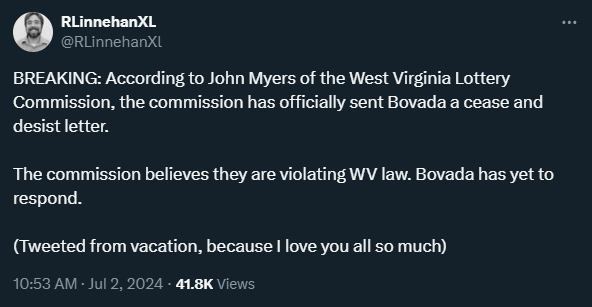
Mike Watters-USA TODAY Sports
- Bovada is still operating in Connecticut and West Virginia despite recent cease-and-desist letters
- The illegal, offshore operator recently left Michigan and Colorado after the states sent notices of their own
- Bovada is currently not accessible in seven U.S. states
Bovada exited Michigan and Colorado after receiving cease-and-desist letters last month, but seems to be hesitating in its decision for the two most recent states to send the offshore operator notices.
The unregulated, offshore sports betting and casino operator is still live in both Connecticut and West Virginia, despite both states sending parent-company Harp Media B.V. a cease-and-desist letter. Harp Media B.V., which operates the the offshore and unlicensed online sportsbook, is located in Willemstad, Curaçao.
The Connecticut Department of Consumer Protections sent its notice to Bovada on Friday, June 14, while the West Virginia Lottery Commission sent its letter on Thursday, June 27.
No Contact With Connecticut, West Virginia
Despite letters being sent to Bovada, gaming regulators in both Connecticut and West Virginia had no updates on any potential action from the company.
A spokesperson for the Connecticut Department of Consumer Protections told Sports Betting Dime on June 11 that it would be sending Bovada a cease-and-desist letter. The notice went out to the operator three days later.
The same spokesperson today told Sports Betting Dime there is no new update from Bovada.
In the cease-and-desist letter written by Kristofer Gilman, Director of Gaming in Connecticut, Harp Media B.V. is notified that it is in violation of Connecticut General Statutes 53-278b, 53-278d, and the Connecticut Unfair Trade Practices Act (CUTPA).
Bovada does not possess an online gaming operator’s license in the state, nor do its actions fall within any of the excepted activities to the prohibition on gambling, Gilman wrote in the notice.
“Bovada’s promotion of unlicensed and illegal gambling services is also an unfair trade practice, which violates CUTPA,” Gilman wrote.
John Myers, director of the West Virginia Lottery, revealed to Sports Betting Dime on July 2 that the commission officially sent Bovada a cease-and-desist letter on June 27. Myers said the lottery commission believes Bovada is “violating West Virginia law” and provided no more information on what the letter contained.
Myers today said “there has been no change as of yet” but hopes to release a statement on the issue soon.

Still Operational in Both States
Bovada is still operational in both West Virginia and Connecticut despite the notices. The operator recently pulled out of both Michigan and Colorado after gaming regulators sent them notices in late May and early June.
As of July 9, Bovada has banned users from Nevada, New Jersey, New York, Maryland, Delaware, Michigan and Colorado.

As noted on Bovada’s website, customers living in restricted states can only withdraw remaining funds in their accounts as cryptocurrency.
Rob covers all regulatory developments in online gambling. He specializes in US sports betting news along with casino regulation news as one of the most trusted sources in the country.
Bovada, a popular online gambling platform, has been making headlines recently for its decision to continue operating in Connecticut and West Virginia despite receiving cease and desist letters from state authorities. The company has been facing legal challenges in these states due to their online gambling activities, which are not licensed or regulated by the respective state governments.
In Connecticut, Bovada has been operating without a license from the state’s Department of Consumer Protection, which regulates gambling activities in the state. The department issued a cease and desist letter to Bovada in an attempt to shut down their operations in the state. However, Bovada has chosen to ignore the letter and continue offering their services to residents of Connecticut.
Similarly, in West Virginia, Bovada has been operating without a license from the state’s Lottery Commission, which oversees gambling activities in the state. The commission also issued a cease and desist letter to Bovada, but the company has chosen to defy the order and continue operating in West Virginia.
The decision by Bovada to continue operating in these states despite the cease and desist letters has raised concerns among state authorities and lawmakers. They argue that Bovada’s activities are illegal and unregulated, putting consumers at risk of fraud and other criminal activities.
In response to the controversy, Bovada has defended its actions by stating that they operate under the jurisdiction of the Kahnawake Gaming Commission, a regulatory body based in Canada. The company claims that they are not subject to the laws and regulations of individual states in the US, as they are an offshore entity.
Despite Bovada’s arguments, state authorities in Connecticut and West Virginia are determined to crack down on the company’s operations. They have warned residents against using Bovada’s services and have urged the company to comply with state laws or face legal consequences.
In conclusion, the situation involving Bovada’s operations in Connecticut and West Virginia highlights the challenges of regulating online gambling in the US. As the debate continues, it remains to be seen how state authorities will respond to Bovada’s defiance of their cease and desist letters.
